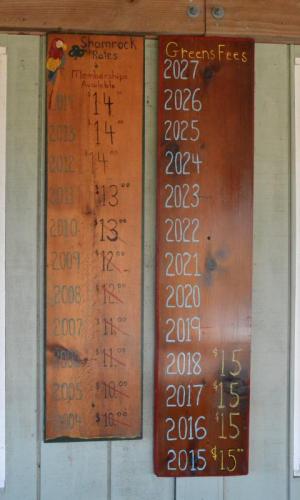After more than 30 years, Bob Stenger retires from Rehoboth
It’s Bob Stenger’s last day as Rehoboth’s wastewater treatment plant supervisor. He, his staff and some other city officials have just started eating some Grotto pizza. He shares an office with staff members, but his area is mostly clear – there’s nothing on the walls near his desk. and the desk basically has just his engraved nameplate.
“This is the last thing I have on my schedule to do,” he said of the interview, settling into his chair.
After more than 30 years with Rehoboth’s wastewater department, all but a year and a half of which he was supervisor, Stenger retired at the end of January. Stenger said the thing he’ll miss most is his fellow wastewater employees. Most of the folks have been here for more than 25 years, he said.
“They’re kind of like my family,” he said.
Stenger said he won’t miss the work.
“The sweet part will be shedding the day-to-day worries,” he said.
Stenger was born in West Virginia, but he’s been living in the Cape Region practically his whole life after his dad got a teaching opportunity and moved the family to the area.
“I know. I’m not quite a local,” he said, smiling.
Stenger has been in the wastewater industry for almost 39 years. He started in Lewes while he was still in college after his dad made him get a summer job. He said he saw a job opening for the plant in Lewes and he thought the hours fit a young man’s lifestyle – 3 to 11 p.m.
“I could sleep in, and the bars were still open when I got off work,” he said.
Enrolled at Salisbury University at the time, majoring in physical geography, Stenger never returned after getting the job in Lewes. Some people retired and advancement came rapidly, he said.
Shaking his head, recognizing his stubbornness, Stenger said he never officially graduated from college. He said he took classes at Delaware Technical Community College and continuing education courses throughout his time with the plant, but officially, he’s one or two courses short.
“There’s some intro-level course to critical writing, that I was just like, ‘There’s no way I’m going back to college for that,’” he said. “My mom, who was also a teacher, was disappointed.”
Stenger started in Rehoboth in 1987, when the city was transitioning from its old plant to the plant it has now. That’s one of the reasons he decided to retire – the current treatment plant has a lot of work coming its way in the years to come and, he said, it’s someone else’s turn to guide construction. He said he stuck around long enough to see the outfall get built and working, and that was enough for him.
“It wore my old ass out,” he said of the outfall project. “It’s time for someone else, that’s new and fresh, to take on the new challenges.”
Stenger has a laid-back way about him, but the job demands of the wastewater industry are not laid-back.
Running a wastewater plant is a 24-hour-a-day, 7-day-a-week job. In this industry, if something breaks, it needs to be fixed immediately, Stenger said.
“I’ve never really been off. There’s not been a weekend, a holiday or a vacation that hasn’t been interrupted because of an issue at the plant or a piece of infrastructure in the field,” he said. “In this field, there is no waiting. There’s a lot of time demands on the people who work in the wastewater industry.”
The no-waiting demands also apply to weather conditions. Equipment breakdowns – in the dead of winter, on 100-degree, 100-percent-humidity-days or in the middle of the night – need to be dealt with immediately.
“When it’s 12 degrees, with 30 to 40 mph winds, those are tough nights,” he said.
On top of time and weather demands, there are federal and state agencies regularly checking in to make sure environmental standards are being met.
Stenger said over the years there were times when he and people from Environmental Protection Agency and Department of Natural Resources and Environmental Control butted heads, but for the most part, it was a good relationship because everyone really is trying to work together to do what’s best for the environment. This treatment plant is a necessary part of everyone’s life, and making it work the best it can is in everyone’s best interest, he said.
The Rehoboth wastewater treatment plant is designed to treat a maximum of 3.4 million gallons of wastewater a day. Stenger said the demands on the plant fluctuate greatly depending on the time of year – tourist season versus winter. He said the plant also isn’t that big. He said, for example, Washington, D.C., might treat 360 million gallons a day, while Rehoboth would do that in a year.
Stenger said he realizes the idea of working at a wastewater treatment plant doesn’t appeal to most people because it’s a treatment plant dealing with wastewater. But, he said, early into his time he realized it’s not that much different from any other production facility. He said there’s almost no contact with the wastewater, and running it requires a wide range of scientific knowledge.
“Sometimes we joke it’s the best-kept secret in the production field,” he said, with a smile that says, “I know, I’m putting lipstick on a pig.”
Almost 40 years later, Stenger said he’s still wondering what he’s going to be doing with his life. But he’s not really wondering. He knows what he’s going to be doing, and all it involves, for the most part, is waking up in time to ride a lawnmower over acres of grass in his backyard.
Stenger and his wife, Wendy, own and operate Stenger’s Shamrock Farms Par 3 Golf Course, off Route 16 just outside Milton. The couple opened the course in 2003 on land where his father had a small farm. Stenger said there wasn’t some great master plan to build the course, but after putting in one hole and then another and then another, the course emerged. Stenger said it’s a fun job, with low stress. It’s just a two-person show and it basically pays for itself, he said.
“It’s like most things in life,” he said. “It kind of just happened.”
Chris Flood has been working for the Cape Gazette since early 2014. He currently covers Rehoboth Beach and Henlopen Acres, but has also covered Dewey Beach and the state government. He covers environmental stories, business stories and random stories on subjects he finds interesting, and he also writes a column called Choppin’ Wood that runs every other week. He’s a graduate of the University of Maine and the Landing School of Boat Building & Design.

























































